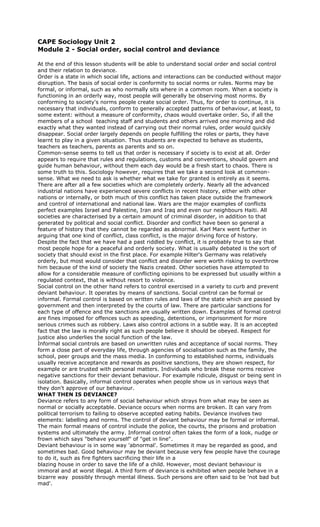
Cape sociology unit 2 crime and deviance
- 1. CAPE Sociology Unit 2 Module 2 - Social order, social control and deviance At the end of this lesson students will be able to understand social order and social control and their relation to deviance. Order is a state in which social life, actions and interactions can be conducted without major disruption. The basis of social order is conformity to social norms or rules. Norms may be formal, or informal, such as who normally sits where in a common room. When a society is functioning in an orderly way, most people will generally be observing most norms. By conforming to society's norms people create social order. Thus, for order to continue, it is necessary that individuals, conform to generally accepted patterns of behaviour, at least, to some extent: without a measure of conformity, chaos would overtake order. So, if all the members of a school teaching staff and students and others arrived one morning and did exactly what they wanted instead of carrying out their normal rules, order would quickly disappear. Social order largely depends on people fulfilling the roles or parts, they have learnt to play in a given situation. Thus students are expected to behave as students, teachers as teachers, parents as parents and so on. Common-sense seems to tell us that order is necessary if society is to exist at all. Order appears to require that rules and regulations, customs and conventions, should govern and guide human behaviour, without them each day would be a fresh start to chaos. There is some truth to this. Sociology however, requires that we take a second look at commonsense. What we need to ask is whether what we take for granted is entirely as it seems. There are after all a few societies which are completely orderly. Nearly all the advanced industrial nations have experienced severe conflicts in recent history, either with other nations or internally, or both much of this conflict has taken place outside the framework and control of international and national law. Wars are the major examples of conflicts perfect examples Israel and Palestine, Iran and Iraq and even our neighbours Haiti. All societies are characterised by a certain amount of criminal disorder, in addition to that generated by political and social conflict. Disorder and conflict have been so general a feature of history that they cannot be regarded as abnormal. Karl Marx went further in arguing that one kind of conflict, class conflict, is the major driving force of history. Despite the fact that we have had a past riddled by conflict, it is probably true to say that most people hope for a peaceful and orderly society. What is usually debated is the sort of society that should exist in the first place. For example Hilter's Germany was relatively orderly, but most would consider that conflict and disorder were worth risking to overthrow him because of the kind of society the Nazis created. Other societies have attempted to allow for a considerable measure of conflicting opinions to be expressed but usually within a regulated context, that is without resort to violence. Social control on the other hand refers to control exercised in a variety to curb and prevent deviant behaviour. It operates by means of sanctions. Social control can be formal or informal. Formal control is based on written rules and laws of the state which are passed by government and then interpreted by the courts of law. There are particular sanctions for each type of offence and the sanctions are usually written down. Examples of formal control are fines imposed for offences such as speeding, detentions, or imprisonment for more serious crimes such as robbery. Laws also control actions in a subtle way. It is an accepted fact that the law is morally right as such people believe it should be obeyed. Respect for justice also underlies the social function of the law. Informal social controls are based on unwritten rules and acceptance of social norms. They form a close part of everyday life, through agencies of socialisation such as the family, the school, peer groups and the mass media. In conforming to established norms, individuals usually receive acceptance and rewards as positive sanctions, they are shown respect, for example or are trusted with personal matters. Individuals who break these norms receive negative sanctions for their deviant behaviour. For example ridicule, disgust or being sent in isolation. Basically, informal control operates when people show us in various ways that they don't approve of our behaviour. WHAT THEN IS DEVIANCE? Deviance refers to any form of social behaviour which strays from what may be seen as normal or socially acceptable. Deviance occurs when norms are broken. It can vary from political terrorism to failing to observe accepted eating habits. Deviance involves two elements: labelling and norms. The control of deviant behaviour may be formal or informal. The main formal means of control include the police, the courts, the prisons and probation systems and ultimately the army. Informal control often takes the form of a look, nudge or frown which says "behave yourself" of "get in line". Deviant behaviour is in some way 'abnormal'. Sometimes it may be regarded as good, and sometimes bad. Good behaviour may be deviant because very few people have the courage to do it, such as fire fighters sacrificing their life in a blazing house in order to save the life of a child. However, most deviant behaviour is immoral and at worst illegal. A third form of deviance is exhibited when people behave in a bizarre way possibly through mental illness. Such persons are often said to be 'not bad but mad'.